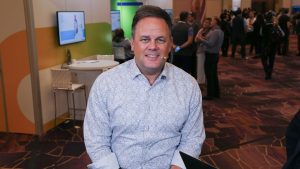Open Standards and The Common Ground (As I See It) [DataPortability]
Over on the Open Web Foundation mailing list Eran Hammer-Lahav who, despite his gruff and disagreeable personality, I respect greatly for his work in the development of open standards, is effectively calling for a complete shakeup of the foundation and the efforts being poured into the ‘common ground’ of the standards efforts.
Let me define the ‘Common Ground’ as I see it.
Building strong common ground is like building strong open standards deep into the stack. Just like a software stack, our community needs a stack of organizations that are loosely coupled and open to participation. Groups like the W3C and IETF provide a rock solid core, more agile groups focused on specific standards like OpenID and Oauth are in the middle and a project like the DataPortability project was supposed to be on top – a kind of user interface layer.
You see, good standards efforts are necessarily projects that work to solve one small problem well. The problems are often deep technical challenges that attract passionate and, let’s face it, geeky people to hack, debate and decide on details that don’t hit the radar for 99.9% of the population.
The problem, of course, is that the rest of the world has to care for a standard to matter.
Leaders and project managers need to be found, real companies need to get involved (not just their staff), collaboration platforms need to facilitate real and open discussion, calls for collaboration need to be heard, specs need to be written (and written well), libraries need to be written, governance needs to be put in place and so on.
Also, once the standard is (half) baked, less involved hackers need to participate to test the theories in the real world. Less savvy developers need to hear about the standard and understand it. Business people need to understand the value of using a standard over a proprietary solution. They also need IP protections in place to ensure that by using the standard they are not putting their company at risk. Marketing people need to know how to sell it to their customer base. Customers need to know how to look for and choose open solutions to create a market place that rewards openness.
All of this is ‘Common Ground’. It is common to any standards effort and there should – no must – be an organization that is just as lean, mean and aggressive as Facebook in place to provide these resources if we are ever going to compete with closed solutions.
At the start of 2008, the DataPortability project became very popular.
![]() DataPortability’s goal was not to build standards, but rather to promote them. To provide much of the common ground that I described above.
DataPortability’s goal was not to build standards, but rather to promote them. To provide much of the common ground that I described above.
The DP project’s particular mission, in my mind at least, was to focus on the marketing effort. To build a massive spot light and to shine that intense light on the people, organizations and standards that were getting the job done.
Is the OWF providing a generic legal/IPR framework? Fantastic! It was the DPP’s job to let everyone know – developers, business execs, media, potential editors, contributors and more. Our job was not, and should never be to start the framework itself, but rather to advocate for, provide context around and promote the hell out of someone else’s effort to do so.
Is a conference happening next year? Excellent. It was the DPP’s job to get in touch with the conference organizer, organize not just a DP panel, but a DP Track and to create room (and perhaps even a narrative) inside which the people doing the actual work can speak.
Has Facebook just announced a new feature that could have been achieved through a combination of existing open standards? Then it is the DPP’s job to consult with each of those standards groups and create a cohesive response/set of quotes for the media to use.
What is the relationship Facebook Platform, OpenSocial, Open Standards, OpenID, OAuth, Portable Contacts and Twitter’s ‘Open API’? DataPortability.org should have the answer neatly described on its website.
![]() Unfortunately, though, many in the standards community chose to fight the creation of the project for whatever reasons crossed their mind at the time. They used all sorts of methods to undermine the effort. Some that would put Fox News to shame.
Unfortunately, though, many in the standards community chose to fight the creation of the project for whatever reasons crossed their mind at the time. They used all sorts of methods to undermine the effort. Some that would put Fox News to shame.
The result, of course, has been a diversion from the important work of providing this common ground to the standards community to a self-protection state of creating governance and creating our own ‘deliverables’ in order to justify and protect our own existence.
I have, as a result of a series of unfortunate events, fallen out of touch with the Steering group at the DPP. Moving to the US, getting disillusioned with the community I admired (not those involved with DPP. My friends at the DPP Steering group have always performed very admirably and worked extremely hard) and ultimately shifting my world view to realize that the best contribution I can make – the best way to really move the needle – is to ship Data Portability compliant software at scale.
At this juncture, however, I think it’s time for us all to refocus on our original mission for the DataPortability Project.
To restate my humble view on the matter:
To provide a website that explains data portability to various audiences in neat and concise ways. It is the onramp for the standards community. You should be able to send anyone to ‘dataportability.org’ and they ‘get it’ and know what to do next.
To provide context and advocacy on news and development from inside and outside the standards community so that media, execs and less involved developers can understand and react
To build a community of interested parties so that they can swam to the aid of standards groups or the standards effort in general.
To act as a market force to (yes I’m going to say it) pick winners. To highlight what works, what doesn’t and what should be done next to move the whole effort forward. Nothing is as powerful as removing confusion and planting a big red flag on the answer.
To recognize that we have the authority to do whatever we want to do because we are an independent, private group who has chosen to create public/transparent processes. We need to believe in ourselves. If we do good work, then people will listen. If we don’t then they can listen to someone else.
These ideals have value…
This necessarily means that the only real deliverable from the project would be a small set of communication tools that build community, context and advocacy around what we believe is the ‘truth’ (or at least things worth paying attention to) in the broader standards community.
Many have scoffed at that these goals in the past claiming that there was no ‘value’. In my book this set of goals is not only a very worthy, it is increasingly critical to the success and health of the web.
A message from John Furrier, co-founder of SiliconANGLE:
Your vote of support is important to us and it helps us keep the content FREE.
One click below supports our mission to provide free, deep, and relevant content.
Join our community on YouTube
Join the community that includes more than 15,000 #CubeAlumni experts, including Amazon.com CEO Andy Jassy, Dell Technologies founder and CEO Michael Dell, Intel CEO Pat Gelsinger, and many more luminaries and experts.
THANK YOU













